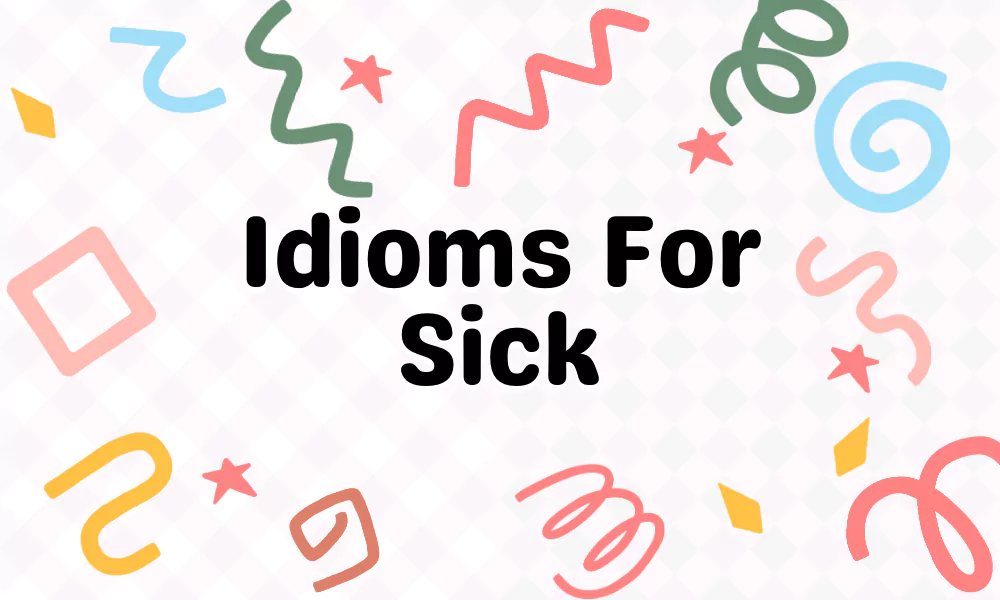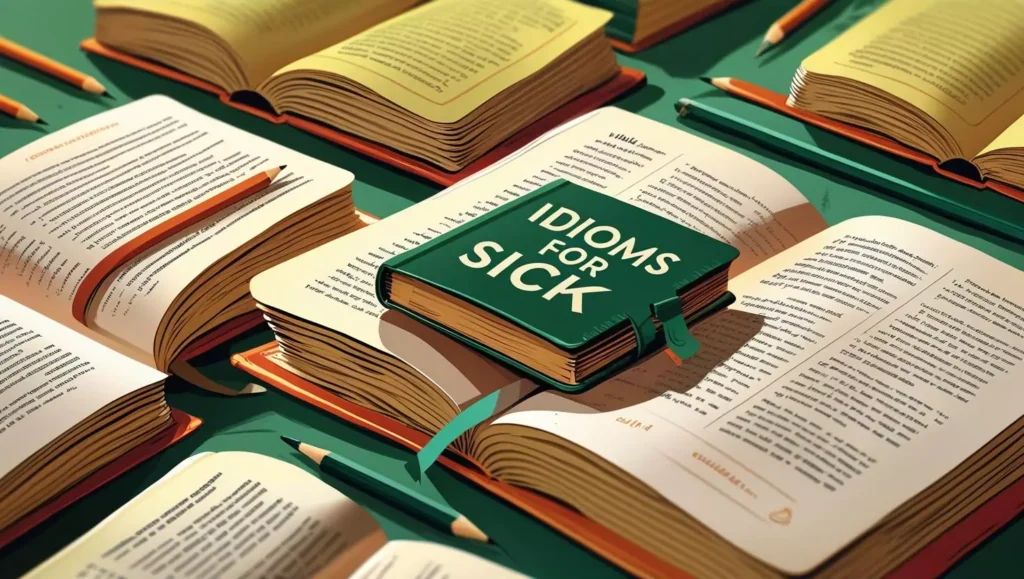Idioms for Sick – Common English Phrases to Describe Illness

Feeling sick is never fun, but English gives us many colorful idioms to describe the experience. Instead of simply saying “I’m sick,” people often use creative phrases like “under the weather” or “feeling blue” to explain how they feel. These expressions don’t always mean exactly what the words say, but they make conversations more natural and engaging. In this article, we’ll explore popular idioms for sickness, explain their meanings, and show you how to use them in real sentences. By learning these phrases, you’ll expand your vocabulary, sound more fluent, and be able to express your health experiences in a fun and effective way.
What Are Idioms for Sick?
Idioms for being sick are common English expressions used to describe illness in a more creative way. Instead of saying “I don’t feel well,” people often use phrases like “under the weather” or “caught a bug.” These idioms don’t literally mean the words they use, but they help make conversations more natural, expressive, and sometimes even lighthearted. Knowing them will improve your fluency and help you understand native speakers better.

Commonly Used Idioms for Sick
- Under the weather – Feeling slightly ill.
Example: I won’t come to work today, I’m feeling under the weather. - Catch a cold – To become sick with a cold.
Example: She caught a cold after walking home in the rain. - Come down with something – To start feeling sick.
Example: I think I’m coming down with the flu. - Catch a bug – To get a mild illness.
Example: He caught a stomach bug last week. - Feeling off-color – Not feeling well.
Example: She’s looking a bit off-color today. - Sick as a dog – Extremely ill.
Example: I was sick as a dog after eating that seafood. - Fever pitch – Extreme excitement or agitation (sometimes from illness).
Example: The crowd’s emotions reached fever pitch. - Look like death warmed up – Look very sick and tired.
Example: After the surgery, he looked like death warmed up. - In bad shape – Not healthy.
Example: He’s in bad shape after that flu. - Out of sorts – Feeling unwell or upset.
Example: I didn’t sleep well, so I’m a bit out of sorts. - Sick and tired – Extremely annoyed or exhausted.
Example: I’m sick and tired of catching colds every winter. - Kick the bucket – To die (informal).
Example: The old man finally kicked the bucket. - At death’s door – Extremely ill.
Example: He was at death’s door during the infection. - Peachy keen (sarcastic) – Actually feeling sick.
Example: Oh great, food poisoning again. Peachy keen! - Have a frog in one’s throat – A sore or hoarse throat.
Example: Sorry, I’ve got a frog in my throat today. - Green around the gills – Looking sick or nauseous.
Example: She went green around the gills on the boat. - Black out – To faint.
Example: He blacked out from dehydration. - Feel like death – Feeling extremely weak or sick.
Example: After the fever, I felt like death. - In poor health – Generally unwell.
Example: His grandmother is in poor health these days. - Run down – Feeling weak from illness or fatigue.
Example: Working too much has left me run down. - Under the knife – Having surgery.
Example: He went under the knife for his appendix. - Breaking out in a cold sweat – Nervousness or sickness.
Example: She broke out in a cold sweat before fainting. - Pass out – To faint.
Example: He passed out from the heat. - Sick to one’s stomach – Feeling nauseous.
Example: The bad news left me sick to my stomach. - Weak at the knees – Feeling physically weak.
Example: I was weak at the knees after the flu. - Feel lousy – Feeling unwell.
Example: I feel lousy after staying up all night. - Out cold – Unconscious.
Example: He was out cold after the accident. - Laid up – Stuck in bed due to illness.
Example: She’s laid up with a bad flu. - Down for the count – Too weak to continue.
Example: That flu had me down for the count. - Bed of pain – To be very sick or injured.
Example: He was in a bed of pain after the surgery. - On one’s last legs – Very weak, near collapse.
Example: After the marathon, I was on my last legs. - Out of breath – Having difficulty breathing.
Example: Climbing the stairs left me out of breath. - Broken-hearted (figurative sickness) – Emotional pain.
Example: She’s broken-hearted after the breakup. - Knock someone out – Make someone unconscious.
Example: The medicine knocked me out last night. - Have a splitting headache – Severe headache.
Example: I can’t think, I have a splitting headache. - Under the influence – Affected by drugs/alcohol.
Example: He drove while under the influence. - Pale as a ghost – Looking very pale and sick.
Example: She went pale as a ghost before fainting. - Sick at heart – Deeply troubled emotionally.
Example: I was sick at heart after hearing the news. - Sickly – Generally unhealthy.
Example: He looks a bit sickly today. - White as a sheet – Extremely pale.
Example: He was white as a sheet when he saw the blood. - Cough one’s lungs out – Coughing heavily.
Example: I was coughing my lungs out all night. - Feel rotten – Feeling awful.
Example: I feel rotten with this flu. - Feeling groggy – Dizzy or weak.
Example: I felt groggy after the medicine. - On the mend – Recovering from illness.
Example: I’m on the mend after a week of rest. - Healing touch – Ability to make someone better.
Example: Grandma’s soup has a healing touch. - Burning up – Having a fever.
Example: You’re burning up, go rest! - Go downhill – Health getting worse.
Example: His condition is going downhill fast. - Fit as a fiddle (opposite) – In very good health.
Example: After recovery, he’s fit as a fiddle again. - Bite the dust – To die (informal).
Example: Many soldiers bit the dust in war. - Out of commission – Unable to function due to illness.
Example: I’ll be out of commission this week with the flu.
Rare and Unique Idioms for Sick
- Die with one’s boots on – To die while still active.
Example: He worked until the end, dying with his boots on. - Lick one’s wounds – To recover after illness or defeat.
Example: I stayed home to lick my wounds after the flu. - Take one’s medicine – To accept the consequences.
Example: I had to take my medicine after ignoring the doctor. - Have one foot in the grave – Near death.
Example: The old man looked like he had one foot in the grave. - Ache all over – Body pain everywhere.
Example: After the fever, I ached all over. - Sick as a parrot – Very disappointed.
Example: He was sick as a parrot after losing the match. - Hospital pass – Something difficult or dangerous.
Example: That assignment was a real hospital pass. - Dose of one’s own medicine – To suffer from what you caused.
Example: The prankster got a dose of his own medicine. - Pining away – Becoming sick from sadness.
Example: She was pining away after the breakup. - Ill wind – Something bad that affects people.
Example: The rumor spread like an ill wind. - Make someone sick – To disgust someone.
Example: That behavior makes me sick. - Take sick – To suddenly become ill.
Example: He took sick during the flight. - In the grip of illness – Severely ill.
Example: The city was in the grip of flu season. - Wasting disease – Illness that weakens the body.
Example: He suffered from a wasting disease. - Sick unto death – Extremely weary or ill.
Example: I was sick unto death with worry. - Ache in the bones – Feeling illness coming.
Example: I feel it in my bones—I’m getting sick. - Faint of heart – Weak or timid.
Example: That horror film is not for the faint of heart. - Catch your death (of cold) – Severe illness from cold.
Example: Wear a coat or you’ll catch your death! - Under a spell of sickness – Temporary illness.
Example: He was under a spell of sickness last week. - Bodily decline – Health weakening.
Example: His bodily decline was clear with age.
Sick Idioms in Literature and Pop Culture
- “Mortal coil” (Shakespeare) – The troubles of human life.
Example: He wished to escape this mortal coil. - “Green sickness” (Medieval/Elizabethan lit) – Anemia or lovesickness.
Example: The maiden was pale with green sickness. - “Plague on both your houses” (Romeo & Juliet) – A curse.
Example: He shouted a plague on both your houses! - “Consumption” – Old term for tuberculosis.
Example: She wasted away from consumption. - “Brain fever” (Victorian novels) – Mental illness/fever.
Example: The heroine nearly died of brain fever. - “Spanish flu” – Historical illness used in books/films.
Example: The novel opens during the Spanish flu pandemic. - “Love-sick” – Illness caused by love.
Example: He wandered about, love-sick and sad. - “Pale rider” (Bible/Pop culture) – Symbol of death/plague.
Example: The Pale Rider appeared in the story as Death. - “Sweating sickness” – Tudor-era disease in literature.
Example: Characters feared the sweating sickness. - “Melancholy” – Old term for depression.
Example: The poet wrote of his melancholy. - “Sickened at heart” – Emotional despair.
Example: The hero was sickened at heart. - “Wounded in spirit” – Deep emotional injury.
Example: She was wounded in spirit by the betrayal. - “Plague bearer” – One who spreads illness (fiction trope).
Example: The villain was portrayed as a plague bearer. - “Sick to death” – Extremely tired of something.
Example: He was sick to death of the lies. - “The Great Plague” – Often referenced in novels/history.
Example: The diary recorded life during the Great Plague. - “Invalid” – Term for a chronically sick person.
Example: She lived as an invalid for years. - “Ailing” – Weak or sickly.
Example: The king was ailing in his final days. - “Deathly pale” – Sickly appearance.
Example: The ghost looked deathly pale. - “Rotten to the core” – Figurative sickness/evil.
Example: The corrupt city was rotten to the core. - “Quarantine” – Isolation from illness (modern pop culture too).
Example: The novel describes families in quarantine.

Tips for Using Sick Idioms in Writing and Speech
- Match the Tone – Use light idioms (under the weather) in casual chats, and stronger ones (at death’s door) when describing severe illness.
- Avoid Overuse – Idioms should spice up your language, not overwhelm it. Mix idioms with plain descriptions for balance.
- Know Your Audience – Some idioms are common in British English (sick as a parrot), while others are American (feeling lousy). Pick what your audience understands.
- Add Context – Use idioms alongside symptoms or situations so meaning is clear. Example: I’m under the weather, so I’ll skip dinner tonight.
- Practice in Sentences – Don’t just memorize meanings; write or say them in your own sentences to sound natural and fluent.
Read: Idioms for Hungry
Synonyms and Alternatives for Sick
| Synonyms | Meanings |
|---|---|
| Ill | General word for being unwell. |
| Unwell | Mildly sick or not feeling good. |
| Ailing | Weak or suffering from poor health. |
| Queasy | Feeling nauseous. |
| Nauseated | Feeling the urge to vomit. |
| Infirm | Physically weak, often due to age. |
| Debilitated | Made weak by illness or fatigue. |
| Woozy | Dizzy or lightheaded. |
| Unhealthy | Not in good health. |
| Frail | Physically delicate or easily weakened. |
FAQs
Conclusion
Idioms for sickness are a fun and powerful way to describe how we feel without using the same plain words like “I’m sick.” Expressions such as “under the weather,” “sick as a dog,” or “on the mend” add color and fluency to everyday conversations. By learning these idioms, you’ll not only improve your vocabulary but also sound more natural when speaking or writing in English. Whether you’re chatting with friends, visiting the doctor, or preparing for an English exam, these phrases help you express health experiences more clearly and creatively. Practice them in your daily conversations, and soon you’ll use them just as confidently as native speakers.
